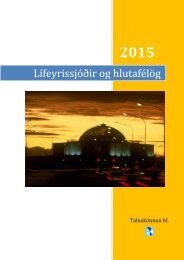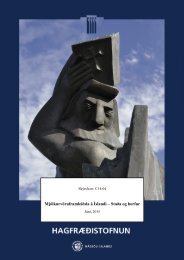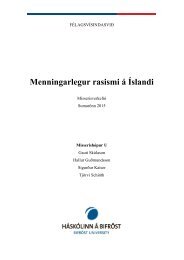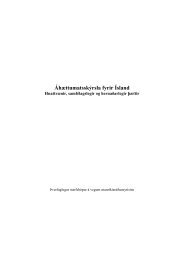You also want an ePaper? Increase the reach of your titles
YUMPU automatically turns print PDFs into web optimized ePapers that Google loves.
WORLD REPORT 2016<br />
HUMAN RIGHTS WATCH<br />
dong activist, was still awaiting a verdict after being tried in November 2014 for<br />
“gathering crowds to disturb social order.”<br />
A number of activists, including elderly journalist Gao Yu, Pu Zhiqiang, Uighur<br />
scholar Ilham Tohti, and anti-corruption activist Liu Ping, continue to be detained<br />
or imprisoned without adequate medical care.<br />
Freedom of Expression<br />
The Chinese government tightly restricts freedom of expression through censorship<br />
and punishments. While the Internet has offered a marginally freer space,<br />
the government censors politically unacceptable information through means<br />
such as the “Great Firewall.” Despite media censorship, journalists and editors<br />
have at times pushed the limits of acceptable expression.<br />
In 2015, government agencies such as the State Internet Information Office issued<br />
multiple new directives, including tightened restrictions over the use of<br />
usernames and avatars, and requirements that writers of online literature register<br />
with their real names. The government has also shut down or restricted access<br />
to Virtual Private Networks (VPNs), which many users depend on to gain<br />
access to content otherwise blocked to users inside the country.<br />
In March, authorities also deployed a new cyber weapon, the “Great Cannon,” to<br />
disrupt the services of GreatFire.org, an organization that has worked to undermine<br />
China’s censorship. In July, the government published a draft cybersecurity<br />
law that will requires domestic and foreign Internet companies to practice censorship,<br />
register users’ real names, localize data, and aid government surveillance.<br />
In August, the government announced that it would station police in major<br />
Internet companies to more effectively prevent “spreading rumors” online.<br />
In January 2015, Education Minister Yuan Guiren told universities to ban teaching<br />
materials that promote Western values and censor speech constituting “attack<br />
and slander against the Party.”<br />
In April, prominent journalist Gao Yu was sentenced to seven years in prison for<br />
allegedly leaking an internal CCP document calling for greater censorship of liberal<br />
and reformist ideas. She was forced to confess, and the confession was<br />
aired on state TV long before criminal investigations against her ran their course.<br />
Financial reporting has often appeared less tendentious than political journalism.<br />
But in August, the government took the alarming step of detaining Wang Xiaolu,<br />
a financial reporter, for having written about the authorities’ deliberations<br />
over withdrawing stabilizing measures in response to the sharp declines in the<br />
Chinese stock market crash in June and July.<br />
Also in August, the Urumqi government tried two brothers of Shohret Hoshur of<br />
Radio Free Asia, a reporter based in the United States, on state security charges;<br />
the brothers likely were being punished for Hoshur’s critical reporting on conditions<br />
in Xinjiang, a sensitive minority region in western China. In September, a<br />
computer programmer was sentenced to 12 years in prison for placing anti-CCP<br />
slogans on TV.<br />
Women’s Rights<br />
While the CCP is rhetorically committed to gender equality, its lack of respect for<br />
human rights means that women continue to face systemic discrimination on issues<br />
ranging from employment to sexual harassment. Family planning policies,<br />
which control the number and spacing of children people can have, continue to<br />
impose severe restrictions on women’s reproductive freedoms. In October, authorities<br />
announced an end to its decades-old “one-child” policy; couples may<br />
now have two children.<br />
In March, at least 10 women’s rights activists were taken into custody by police<br />
for plans to post signs and distribute leaflets to raise awareness about sexual<br />
harassment in three Chinese cities. Five were soon released, but the others were<br />
held for 37 days on charges of “picking quarrels,” sparking a widespread international<br />
outcry. Though the five were released on bail, continuing restrictions on<br />
their movements and police harassment led them to close their organization, the<br />
Weizhiming Women’s Center in Hangzhou.<br />
In March, the Supreme People’s Court and other agencies issued instructions requiring<br />
judges to consider domestic violence as a mitigating circumstance in<br />
criminal cases against victims of such violence. In August, China’s legislature reviewed<br />
a draft of the long-awaited Law against Domestic Violence. While a step<br />
in the right direction, the draft falls short of international standards, particularly<br />
in its definition of domestic violence. Cases of domestic violence in which local<br />
authorities fail to respond appropriately continue to occur with worrying regular-<br />
178<br />
179










